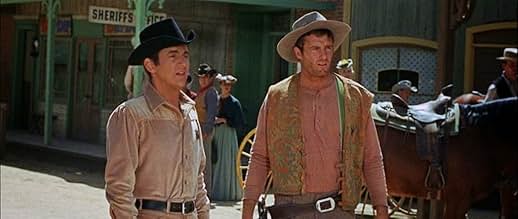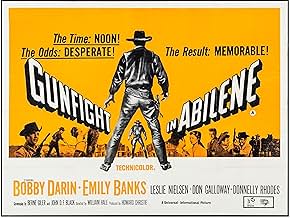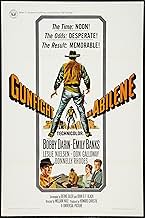A sheriff, haunted by the accidental killing of his best friend, refuses to wear a gun. But when the brother of his best friend is murdered, the lawman must make a choice.A sheriff, haunted by the accidental killing of his best friend, refuses to wear a gun. But when the brother of his best friend is murdered, the lawman must make a choice.A sheriff, haunted by the accidental killing of his best friend, refuses to wear a gun. But when the brother of his best friend is murdered, the lawman must make a choice.
- Director
- Writers
- All cast & crew
- Production, box office & more at IMDbPro
Storyline
Did you know
- TriviaThe battle scene in the beginning of the film is footage from the 1965 movie, Shenandoah.
- GoofsThe clothing worn by the characters in the film resembles modern Western wear more so than post- Civil War dress. This includes pants with belt loops and shirts with buttons down their entire fronts. Bobby Darin's cowboy hat was the style worn with suits in the 1950s.
- ConnectionsReferenced in Never a Dull Moment (1968)
Featured review
Besides one other Western, Journey to Shiloh' (1968) and the obscure early effort Lonnie' (1963), William Hale has worked principally in TV since the start of his career. This is a shame as from the evidence of Gunfight in Abeline' at least, he is able to work comfortably in a major genre with none of the small screen inhibitions which seems to affect directors who cross over.
The present film was received indifferently by critics upon its first appearance and it is hard to see why. While no masterpiece, it is a solid, engaging piece of work, offering Darin one of his finest and most dramatic roles. When one remembers the dull screen impression made by his nearest equivalent in Westerns, that of Audie Murphy (another actor who died relatively young), Darin's considerably more interesting screen persona seems to have been badly wasted. Add to his acting abilities as a vocalist and songwriter - as evidenced by the memorable ballad Amy' over which the credits of this film play out Darin's versatility is very interesting. In fact he was briefly marketed by the ever hopeful studio as the "new Sinatra".
In Abeline' Darin plays Cal Wayne, a man haunted by two accidents: that of the injury of Grant Evers' arm when they where children, and of the death of Evers' brother during a skirmish during the Civil War. Evers' arm is a constant reminder of Wayne's incipient guilt, as well as suggesting the cattle magnate's unfeeling morality. But Evers is no simple black hearted villain. He has behaved with perfect honour towards his intended bride Amy and, although a ruthless businessman, initially at least strives to avoid confrontation and violence with the farming lobby. Far more reprehensible is his henchman Jack Slade, and the mutual distaste between the two is always evident. (The difference is particularly noteworthy when Slade upbraids Evers for his weakness in paying compensation to the farmers for his early trespassing and crop destruction.) Even Evers' final act of violence towards Wayne is one generated through impulsiveness, as the now-sherriff confesses how he killed his employer's brother.
Abeline' builds a compact and satisfying Western drama, albeit small-scale, around the Wayne-Amy-Evers-Slade relationships, and Hale's widescreen compositions, his dollying and tracking are very effective without drawing attention to themselves. Most noticeable is the final showdown. Here he employs some off-centred camera angles to frame the boastful Slade, while the montage of facial shots accompanying the ultimate draw anticipates some of the flamboyance of Leone.
This is a film which is entirely successful in its own rewarding and modest terms, and only fails being memorable by an absence of more colourful supporting actors. Neilsen too (acting straight here, long before the days of 'Airplane!')lacks a certain charisma and some of the film comes across as being slightly glum. If Hale had been able to add a Brennan or a Devine into the mix, them the results could have been marvellous. Instead we have a Western drama well worth seeking out, as a traditional, effective genre outing.
The present film was received indifferently by critics upon its first appearance and it is hard to see why. While no masterpiece, it is a solid, engaging piece of work, offering Darin one of his finest and most dramatic roles. When one remembers the dull screen impression made by his nearest equivalent in Westerns, that of Audie Murphy (another actor who died relatively young), Darin's considerably more interesting screen persona seems to have been badly wasted. Add to his acting abilities as a vocalist and songwriter - as evidenced by the memorable ballad Amy' over which the credits of this film play out Darin's versatility is very interesting. In fact he was briefly marketed by the ever hopeful studio as the "new Sinatra".
In Abeline' Darin plays Cal Wayne, a man haunted by two accidents: that of the injury of Grant Evers' arm when they where children, and of the death of Evers' brother during a skirmish during the Civil War. Evers' arm is a constant reminder of Wayne's incipient guilt, as well as suggesting the cattle magnate's unfeeling morality. But Evers is no simple black hearted villain. He has behaved with perfect honour towards his intended bride Amy and, although a ruthless businessman, initially at least strives to avoid confrontation and violence with the farming lobby. Far more reprehensible is his henchman Jack Slade, and the mutual distaste between the two is always evident. (The difference is particularly noteworthy when Slade upbraids Evers for his weakness in paying compensation to the farmers for his early trespassing and crop destruction.) Even Evers' final act of violence towards Wayne is one generated through impulsiveness, as the now-sherriff confesses how he killed his employer's brother.
Abeline' builds a compact and satisfying Western drama, albeit small-scale, around the Wayne-Amy-Evers-Slade relationships, and Hale's widescreen compositions, his dollying and tracking are very effective without drawing attention to themselves. Most noticeable is the final showdown. Here he employs some off-centred camera angles to frame the boastful Slade, while the montage of facial shots accompanying the ultimate draw anticipates some of the flamboyance of Leone.
This is a film which is entirely successful in its own rewarding and modest terms, and only fails being memorable by an absence of more colourful supporting actors. Neilsen too (acting straight here, long before the days of 'Airplane!')lacks a certain charisma and some of the film comes across as being slightly glum. If Hale had been able to add a Brennan or a Devine into the mix, them the results could have been marvellous. Instead we have a Western drama well worth seeking out, as a traditional, effective genre outing.
- FilmFlaneur
- Mar 4, 2002
- Permalink
Details
- Release date
- Country of origin
- Language
- Also known as
- Goloruki šerif
- Filming locations
- Production company
- See more company credits at IMDbPro
- Runtime1 hour 26 minutes
- Aspect ratio
- 2.35 : 1
Contribute to this page
Suggest an edit or add missing content































